The Benefits of Professional Intervention for Addiction

Understanding the Power of Professional Intervention in Addiction Recovery
Addiction is a complex and chronic illness affecting millions worldwide, impacting physical health, mental well-being, and social relationships. While recovery is achievable, the journey often requires more than self-help methods. Professional intervention plays a crucial role in motivating individuals toward treatment, ensuring safety, and laying the foundation for sustained sobriety. This article explores the core benefits, processes, and methods involved in professional intervention, emphasizing its importance in modern addiction treatment.
Core Advantages and Benefits of Professional Intervention
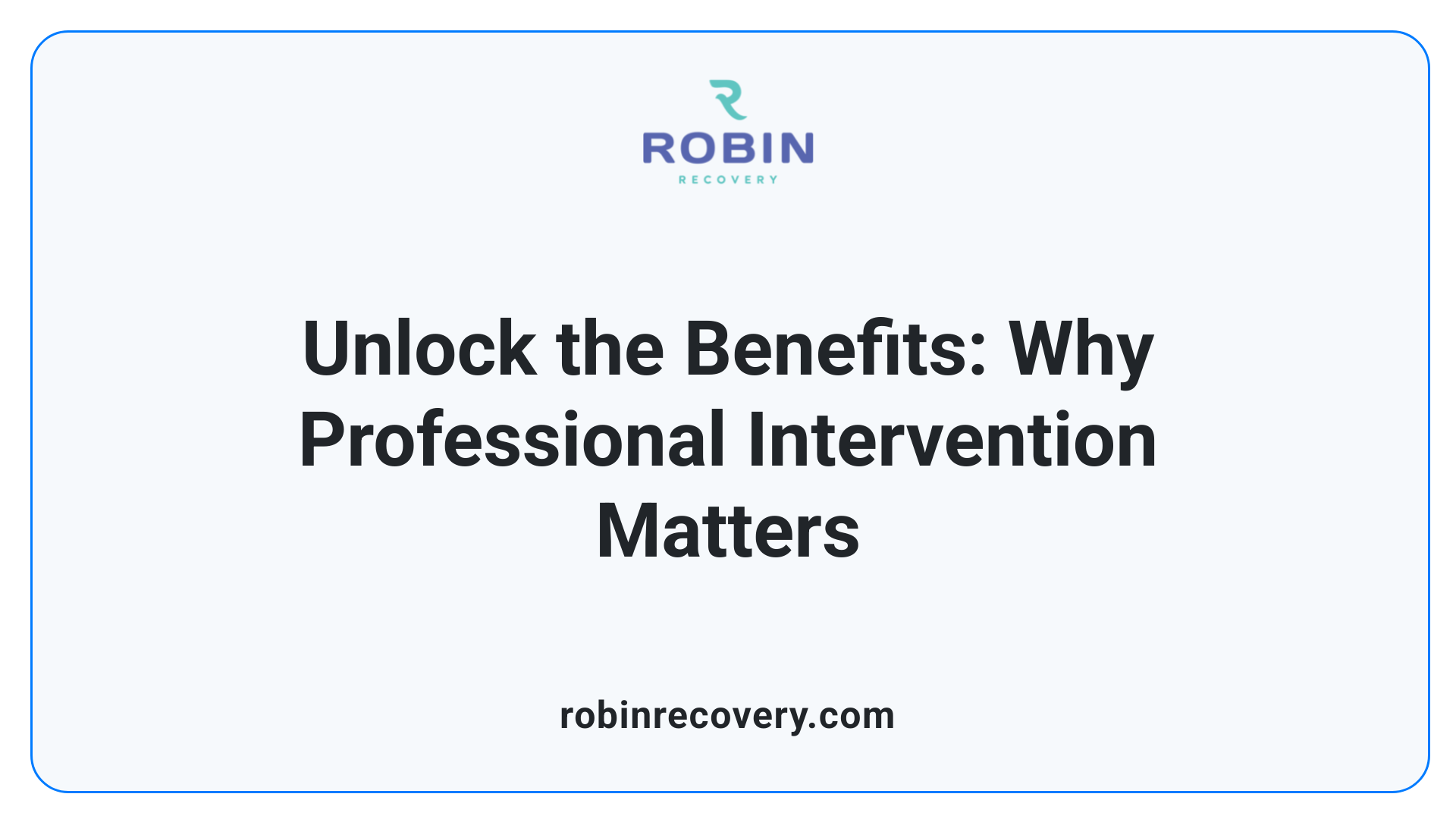
What are the core advantages and benefits of professional intervention for addiction?
A professional intervention plays a vital role in helping individuals recognize their addiction and agree to seek treatment. One of its primary benefits is that it provides a structured and compassionate environment that emphasizes concern and love over blame or anger. When conducted by trained interventionists, the process becomes more effective, especially in complex cases involving mental health issues, violence, or risk of suicide. These specialists are skilled at managing resistance, guiding conversations productively, and ensuring safety throughout the process.
An intervention’s supportive setting allows family members and friends to express their worries and love, which can motivate the individual to accept help. It also helps to improve communication, reduce misunderstandings, and set clear, realistic boundaries. This environment encourages the person to see their behavior’s damaging impact on themselves and their loved ones, creating a sense of urgency and hope for change.
Beyond motivating treatment acceptance, professional intervention addresses the multifaceted nature of addiction. It considers physical health, emotional well-being, and mental health challenges that need attention for sustainable recovery. Medications, counseling, educational programs, and support services organized after an intervention increase the chances of long-term sobriety.
Furthermore, when intervention is supported by professionals, it enhances the likelihood of success. Success rates are notably higher with involvement from trained interventionists, with some studies reporting over 90% success in engaging individuals into treatment. This ultimately leads to improved health outcomes, healthier relationships, and a stronger foundation for ongoing recovery.
In summary, the core advantages of professional intervention include effective motivation, a safe and supportive environment, enhanced acceptance of treatment programs, comprehensive address of health and mental challenges, and substantial improvements in long-term recovery prospects. By facilitating early and decisive action, intervention sets the stage for a healthier, relapse-free life.
The Role and Process of Professional Intervention in Supporting Recovery
What is the role and process of professional intervention in supporting recovery?
Professional intervention is a strategic, structured process that involves trained specialists guiding families and individuals through steps aimed at motivating the person with addiction to seek help. The intervention process is carefully organized to ensure it is respectful, compassionate, and effective.
The primary role of a professional interventionist is to facilitate this process, offering emotional support and expertise throughout. They help plan the intervention, educate families about addiction, and develop a tailored approach suited to the individual's needs and circumstances.
The intervention itself typically involves assessment, family education, rehearsal, confrontation, and follow-up. It begins with evaluating the severity and nature of the addiction, and then preparing the family with information about addiction and treatment options.
During the intervention, the professional guides the family and friends in expressing their concerns with love and without blame, often reading heartfelt letters or sharing personal stories. Confrontation is calibrated carefully to avoid conflict or emotional harm.
Building a trusting environment is crucial. Professionals foster open, honest communication and help manage emotional reactions, increasing the chances that the individual will accept treatment.
Post-intervention, the support continues. The professional assists in transitioning the individual into treatment, plans ongoing support, and helps set the stage for long-term recovery. Overall, the process’s goal is to motivate change while preserving relationships and promoting healing.
Assessment and planning phases
Before any intervention, an assessment of the individual's addiction level, mental health, and particular risk factors is conducted. The intervention plan is then customized to match these insights.
This phase also involves educating family members about addiction, recovery options, and how to communicate effectively during the intervention.
Family education and preparation
Families are taught about the nature of addiction, enabling them to understand the disease rather than viewing it as a moral failing.
Practices such as writing letters, rehearsing conversations, and setting boundaries are part of preparation, equipping the family with tools to participate constructively.
Confrontation and communication techniques
Professional interventions emphasize compassionate confrontation rather than blame.
Strategies include sharing personal concerns, expressing love, and maintaining a calm demeanor.
Participants are encouraged to use
Addressing Substance Use Disorders Effectively Through Intervention
How does professional intervention aid in addressing substance use disorders?
Professional intervention is vital in managing substance use disorders because it introduces a structured, strategic process that involves trained experts, family members, and friends. These professionals, often addiction counselors or interventionists, meticulously plan and guide the process, which helps motivate the individual to seek and accept help.
Interventionists are skilled at assessing the unique needs of each case, offering educational insights about addiction, and managing the dynamics of the group involved. They facilitate open, honest communication while dispelling denial about the severity of the addiction. This fosters understanding and compassion, making it easier for the individual to recognize the need for treatment.
During the intervention, professionals help present various treatment options, including counseling, medication, family therapy, and peer support groups. This broad presentation encourages acceptance by highlighting accessible pathways to recovery. Even if the person does not immediately agree to treatment, professional intervention lays a foundation for follow-up strategies, maintaining a focus on safety and future engagement.
The overall impact of professional intervention is increase in motivation, better access to appropriate care, and creation of a supportive environment for long-term recovery. The involvement of professionals significantly improves the success rate—statistics show over 90% success when trained interventionists facilitate the process.
In summary, professional intervention is an essential tool that combines emotional support, expert guidance, and strategic planning to overcome denial, motivate treatment acceptance, and set the stage for sustained recovery efforts.
Evidence-Based Methods and Approaches Used by Professionals
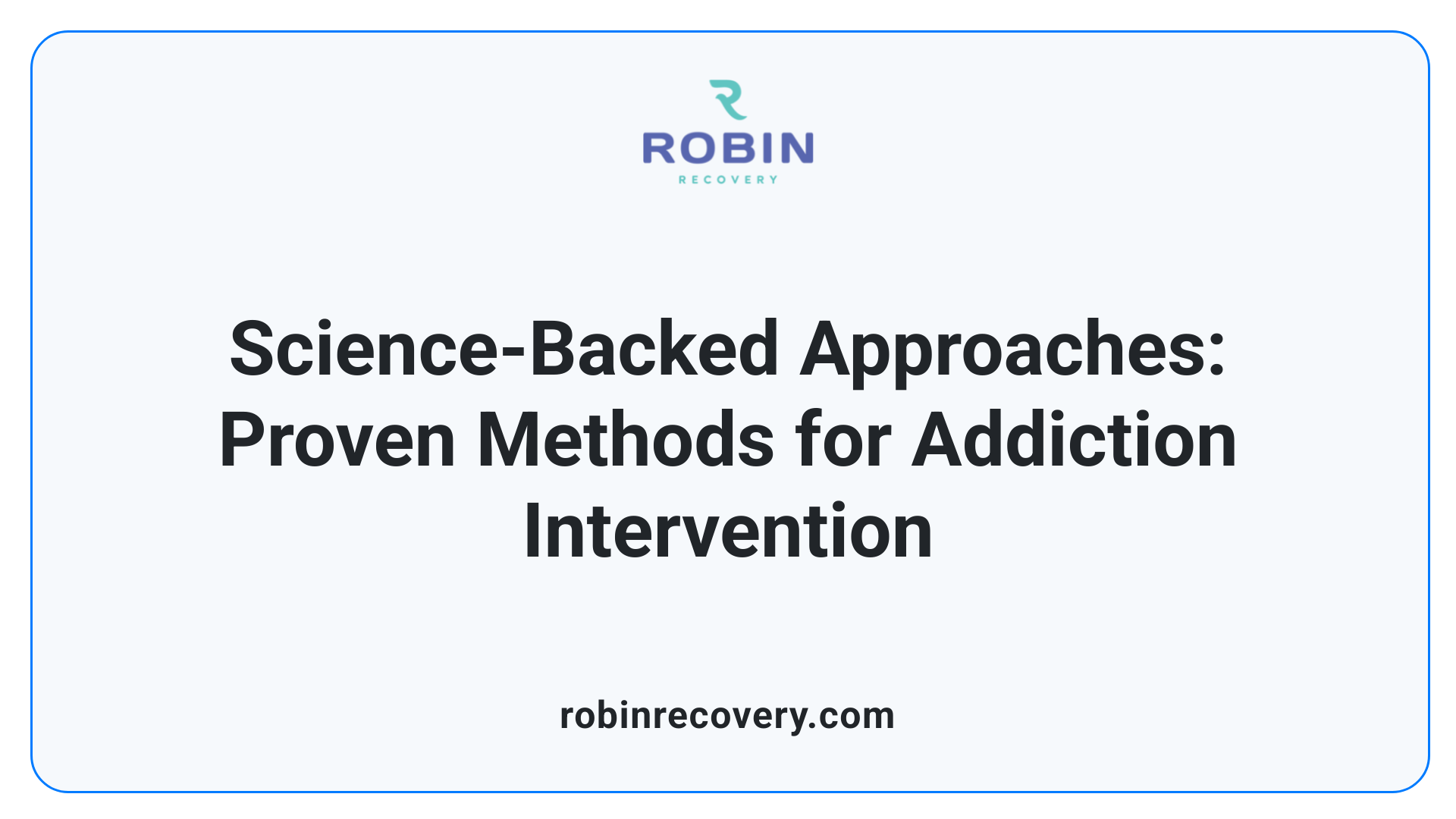
What methods and approaches do professionals use during intervention?
Professionals employ a variety of scientifically supported approaches to maximize the chances of successful intervention and long-term recovery. These methods are tailored to the individual's needs and circumstances, often involving multiple strategies that work synergistically.
Psychotherapeutic techniques form the backbone of many intervention strategies. For example, cognitive-behavioral therapy (CBT) is commonly used to help individuals recognize and modify negative thought patterns and behaviors associated with addiction. Dialectical behavior therapy (DBT) addresses emotional regulation issues, especially in cases involving co-occurring mental health issues. Psychodynamic therapy can uncover deep-seated emotional conflicts that contribute to substance misuse. These approaches aim to address underlying psychological triggers and foster healthier emotional responses.
Alongside psychotherapy, behavioral therapies such as contingency management are used to reinforce positive behaviors. This approach provides tangible rewards for maintaining sobriety or completing specific treatment milestones, effectively motivating change. Motivational interviewing (MI) is another critical technique that focuses on enhancing an individual's internal motivation to pursue treatment. MI involves empathetic dialogue that helps clients explore ambivalence about change and resolve it in favor of seeking help.
Experiential therapies, including art, music, or dance therapy, are also employed to facilitate emotional expression and processing creatively. These therapies can be particularly helpful for individuals who struggle with verbal communication or have complex trauma histories.
Family involvement strategies are central to many intervention frameworks. Family therapy sessions educate loved ones about addiction, improve communication, and develop supportive environments. Specific intervention models like the Johnson Model involve careful planning, confrontation, and offering treatment options while maintaining compassion. Crisis intervention techniques are utilized in urgent situations where immediate action is necessary to prevent harm.
Medical approaches are integrated into intervention plans when appropriate. FDA-approved medications such as naltrexone, disulfiram, acamprosate (for alcohol use disorder), and buprenorphine, methadone (for opioid use disorder) serve to normalize brain chemistry, block euphoric effects, and curb cravings. These medications enhance the effectiveness of behavioral therapies and support sustained recovery.
Overall, the selection of methods depends on the individual’s condition, history, and environment. Often, a combination of psychotherapy, behavioral strategies, family involvement, and medication is used to create a comprehensive treatment plan designed to address all facets of addiction.
Approach Type Key Techniques Purpose Additional Notes Psychotherapeutic Techniques CBT, DBT, psychodynamic therapy Address emotional and cognitive factors Tailored to individual needs Behavioral Therapies Contingency management, motivational interviewing Motivate change, reinforce sobriety Evidence-based, widely used Experiential Therapies Art, music, dance therapy Emotional expression, trauma processing Suitable for non-verbal expression Family Involvement Strategies Family therapy, family system models Foster support, improve communication Critical for holistic recovery Intervention Frameworks Johnson Model, crisis intervention, ARISE, SMART Planning, confrontation, immediate support Varies based on severity and context Pharmacological Interventions Naltrexone, disulfiram, acamprosate, buprenorphine, methadone Manage cravings, block euphoria, prevent relapse FDA-approved, evidence-based
This comprehensive approach ensures that interventions are effective, addressing psychological, behavioral, familial, and biological components of addiction, thereby increasing the likelihood of a successful and sustained recovery.
How Professional Help Improves Treatment Outcomes, Health, and Relationships
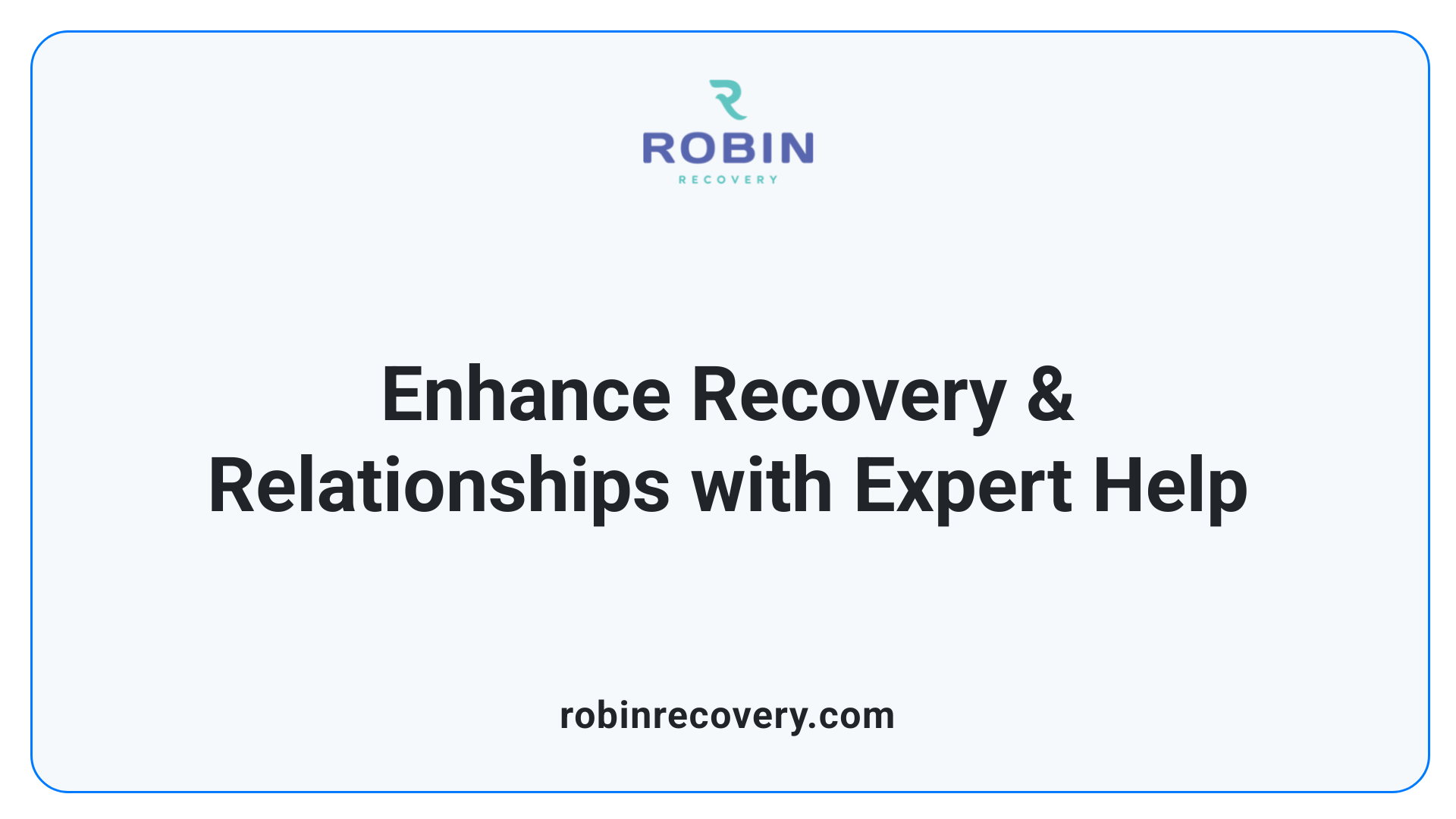
How does professional help improve treatment outcomes, health, and relationships?
Seeking aid from addiction professionals dramatically boosts an individual's chances of successful recovery. These experts use a mix of personalized, evidence-based strategies tailored to each person's unique needs. This comprehensive care involves medical, psychological, and social support components.
One essential aspect of professional treatment is the provision of counseling and therapy. These sessions help individuals address the emotional and mental health issues that often underlie addictive behaviors. Therapies such as cognitive-behavioral therapy (CBT) and motivational interviewing help modify negative thought patterns and foster motivation for change.
Medication-assisted treatments (MAT), including drugs like naltrexone, disulfiram, or buprenorphine, assist in reducing cravings, preventing relapse, and normalizing brain chemistry. When combined with therapy, these medications significantly improve the chances of maintaining sobriety.
Treatment centers create safe environments for detoxification and ongoing medical monitoring. They are equipped to handle medical emergencies, provide holistic therapies—such as mindfulness or TMS—and support mental health recovery. This environment encourages accountability and offers continuous guidance, both crucial in the early and long-term phases of recovery.
Family and social support play a vital role where professionals facilitate this involvement. Family therapy and education sessions help repair strained relationships, rebuild trust, and align loved ones in supporting recovery efforts. Support groups, both in formal settings and through peer networks, provide shared experiences and motivation.
Preventing relapse remains a primary goal. Professionals develop tailored relapse prevention plans that include identifying triggers, developing coping skills, and establishing ongoing support mechanisms. These strategies empower individuals to manage life’s stressors without returning to substance use.
In sum, professional help combines medical, psychological, and social interventions into a structured process that promotes healthier living, stronger relationships, and sustainable recovery. This multidimensional approach addresses not only the addiction itself but also the underlying issues affecting overall well-being, making it far more effective than self-directed efforts alone.
Intervention Type Main Focus Additional Benefits Typical Methods Counseling & Therapy Mental health and behavioral change Emotional stability, coping skills CBT, motivational interviewing Medication-Assisted Treatment Craving control, brain chemistry Reduced relapse, overdose prevention Naltrexone, methadone, buprenorphine Family & Support Groups Relationship repair and social support Enhanced support network Family therapy, peer groups Holistic & Alternative Overall well-being Stress reduction, mindfulness TMS, acupuncture, meditation Ongoing Monitoring Long-term stability Quicker relapse detection Regular check-ups, follow-ups
What are the benefits of combining medication and therapy?
Combining medication with therapy provides a powerful, holistic approach to addiction recovery. Medication helps control physical cravings and normalize brain function, while therapy addresses the psychological roots, helps develop coping skills, and reshapes behaviors. This dual approach has been shown to increase treatment retention, reduce relapses, and improve overall health and functional ability.
What role does family involvement play?
Family participation is crucial as it offers emotional support and helps combat enabling behaviors. Family therapies educate loved ones about addiction, set healthy boundaries, and foster a supportive environment that encourages ongoing recovery. Family involvement often results in better adherence to treatment plans and stronger interpersonal relationships.
How effective are relapse prevention strategies?
Relapse prevention strategies include identifying personal triggers, practicing coping skills, engaging in support groups, and following structured follow-up plans. These efforts equip individuals to manage stress and cravings effectively, significantly decreasing the risk of relapse. Ongoing professional support is vital in adapting prevention techniques to changing circumstances.
Overall, the integration of professional care, family support, medication, and therapy creates a comprehensive recovery pathway. This approach not only enhances immediate treatment outcomes but also lays a strong foundation for lasting health and relational benefits.
Contribution of Interventionists to Successful Recovery and Relapse Prevention
How do interventionists contribute to successful recovery?
Interventionists are essential players in orchestrating effective plans to confront addiction. They guide families and friends through a structured intervention process, helping them prepare emotionally and practically for the difficult conversation. Their expertise facilitates team-based approaches, such as the Johnson Model or ARISE, ensuring that the intervention is compassionate, focused, and productive.
During the intervention, they help the family communicate concerns in a non-blaming manner, often involving rehearsals, planning the sequence of talks, and managing potential resistance. Their role extends beyond the initial confrontation; they provide ongoing support and mentoring, which is critical for long-term success.
Interventionists also educate loved ones about addiction and mental health behaviors. This awareness fosters understanding and reduces conflict, creating a more supportive environment for recovery. Their guidance ensures that the individual perceives the intervention as caring rather than confrontational, increasing acceptance of treatment options.
How do interventionists assist with emotion regulation and management?
Addiction recovery is emotionally challenging for both the individual and their family. Interventionists help manage these emotional responses by creating a safe, empathetic space during the intervention. They teach the family to express concern and love without blame, helping prevent escalation of anger or resentment.
Post-intervention, they assist in emotional regulation, offering coping strategies and support to deal with disappointment if the individual refuses help. This ongoing emotional management helps sustain motivation and prevents relapse triggered by stress or emotional turmoil.
What role does follow-up support and mentoring play?
After the initial intervention, ongoing follow-up support from interventionists keeps the momentum of recovery alive. They mentor families in navigating the treatment process, encouraging ongoing communication and emotional support.
Mentoring may include guiding families on how to set healthy boundaries, monitor progress, and handle setbacks without resorting to punitive measures. This consistent support helps reinforce positive behaviors and facilitates sustained engagement with treatment programs.
What training and expertise do interventionists possess?
Professional interventionists undergo specialized training in addiction, mental health, and counseling techniques. They learn to recognize signs of resistance, manage complex family dynamics, and tailor strategies for individual cases.
Their expertise includes familiarity with various intervention models, understanding of co-occurring disorders, and skills in crisis management, which are particularly important in cases involving violence, mental illness, or recent suicidal thoughts.
This extensive training equips them to conduct interventions efficiently and compassionately, significantly increasing the likelihood of the individual accepting treatment.
How do interventionists contribute to creating a supportive recovery environment?
The role of interventionists extends to fostering a positive and supportive environment that encourages long-term recovery. They help establish a foundation of understanding and patience among family members, which is vital for ongoing recovery efforts.
By guiding the family in expressing concern without judgment, they help build a network of encouragement that motivates the individual to remain engaged in treatment. Their presence and leadership help structure a safe space where individuals feel cared for and supported, reducing the risk of relapse.
In conclusion, interventionists are instrumental in ensuring that recovery processes start on the right foot and are sustained over time. Their guidance, emotional management, expert knowledge, and ongoing support foster an environment conducive to lasting change and relapse prevention.
Best Practices and Tips for Effective Intervention Procedures
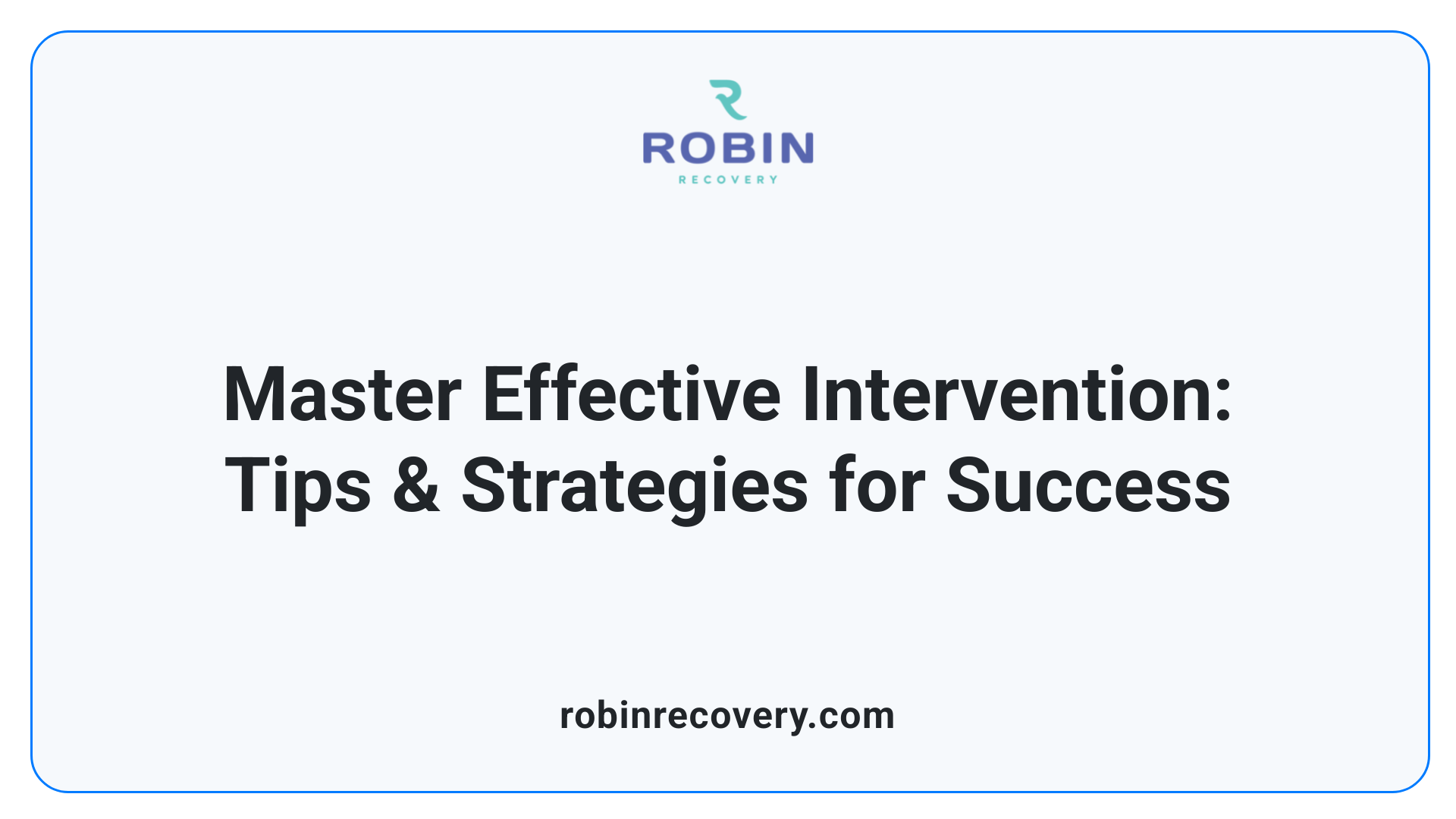
What are some best practices and tips for effective intervention procedures?
Conducting a successful intervention requires careful planning and strategic execution. The first step is assembling a dedicated team typically consisting of four to six supportive individuals, such as family members, friends, and sometimes colleagues. Working with a professional interventionist or counselor can significantly increase the chances of success, especially for complex cases involving mental health issues, violence, or suicidal tendencies.
Thorough preparation is essential. This includes rehearsing the intervention plan, deciding on the right timing, and selecting a calm, neutral environment free of distractions or triggers. Timing the intervention when the individual is sober and calm often leads to better outcomes.
Communication during the intervention should be grounded in love and honesty. Express specific concerns about destructive behaviors and their impacts, using objective evidence and personal feelings rather than blame or shame. It’s important to focus on the person’s well-being and the desire to help them, not on confrontational tactics.
Integrating evidence-based models such as the Johnson Model or Motivational Interviewing increases intervention effectiveness. These models emphasize compassionate confrontation, presenting treatment options, and supporting the individual's readiness to change.
Offering clear, tailored treatment options—including counseling, medication, housing support, and life skills training—gives the individual a feasible pathway to recovery. Post-intervention, providing ongoing emotional and logistical support, encouraging participation in support groups, and maintaining close contact with healthcare providers help reinforce positive change.
It is also advised to involve trained interventionists for guidance and to navigate potential resistance. These professionals help manage emotional responses, address safety concerns, and keep the process focused and respectful.
Finally, the success of an intervention is greatly enhanced when families and friends understand their vital role. Continued engagement, education, and support foster an environment conducive to recovery. Even if initial efforts are not entirely successful, making adjustments and persistent support can substantially improve long-term outcomes for individuals struggling with addiction.
Impact of Intervention on Treatment Acceptance and Engagement
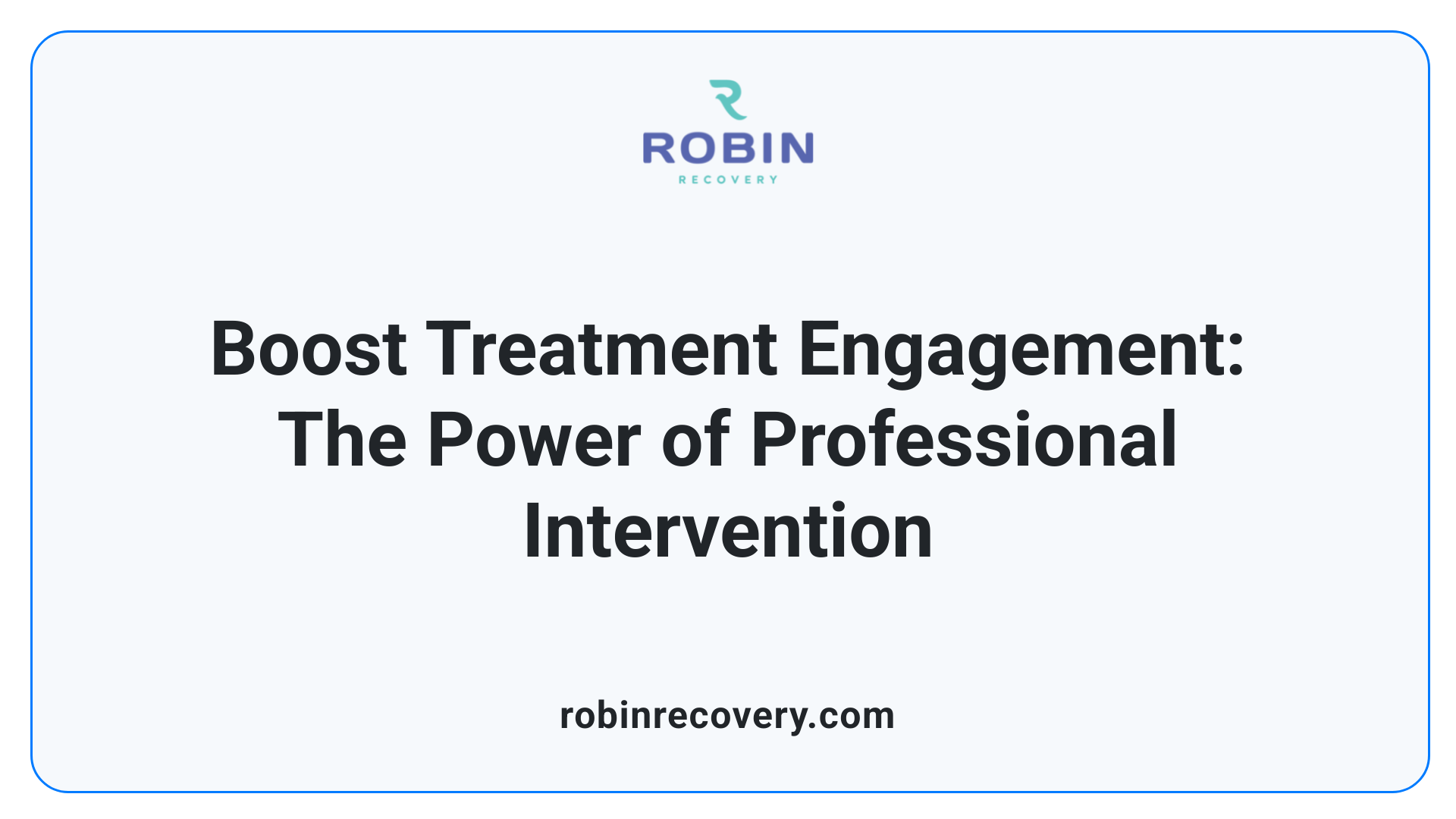
How does professional intervention impact treatment acceptance and engagement?
Professional interventions play a vital role in encouraging individuals struggling with addiction or mental health issues to accept and actively participate in treatment. When an experienced interventionist guides the process, it significantly increases the chances that a person will agree to seek help.
One effective approach is the 'Just Do You' (JDY) intervention, designed to motivate young adults facing serious mental illnesses. This program emphasizes building personal efficacy and fostering a sense of control, which are crucial for engagement. Participants often report higher attendance at treatment sessions and greater emotional investment in their recovery journey.
Interventions improve behavioral participation by making the individual feel supported and understood. They help reduce resistance to treatment by addressing denial and misconceptions about addiction or mental health issues. The process encourages the person to see the benefits of treatment, creating a sense of readiness to change.
Furthermore, interventions strengthen cognitive and emotional commitment. When family members, friends, and professionals collaborate to present a unified, caring front, it creates a trustworthy environment that motivates change. This trust is essential for fostering buy-in, especially in cases where individuals might feel stigmatized or hopeless.
Research indicates that when individuals feel empowered and supported during the intervention, their likelihood of engaging in ongoing treatment increases substantially. Techniques that orient, prepare, and motivate clients—such as motivational interviewing—are effective in this regard. These strategies help individuals recognize their strengths, acknowledge their problems, and accept help in a nonjudgmental way.
Evidence shows that the emotional and psychological readiness cultivated during a professional intervention mediates positive recovery outcomes. When a person actively participates in treatment, they are more likely to adhere to therapeutic plans, attend follow-ups, and achieve sustained sobriety or mental health stability.
In instances involving co-occurring disorders or high-risk situations like violence or suicidal ideation, involving trained professionals meticulously manages safety concerns and ensures that interventions are conducted compassionately and effectively. Their expertise significantly contributes to reducing fear, resistance, and potential relapse.
Overall, professional intervention acts as a catalyst that improves willingness to seek help and participate meaningfully in recovery. By fostering a supportive environment, enhancing motivation, and providing tailored strategies, interventions increase treatment engagement, setting the foundation for long-term success.
Community Support and Evidence-Based Strategies in Addiction Recovery
What evidence-based strategies are involved in professional addiction interventions, and how does community support contribute?
Effective addiction treatment relies on a combination of scientifically supported strategies and active community involvement. Among the key evidence-based approaches used in professional interventions are psychosocial treatments like cognitive-behavioral therapy (CBT), motivational interviewing (MI), relapse prevention (RP), contingency management (CM), family therapy, and twelve-step facilitation. These methods have been proven to significantly reduce substance use and improve long-term recovery outcomes across various drugs.
Cognitive-behavioral therapy helps individuals recognize and modify negative thought patterns and behaviors associated with addiction. Motivational interviewing is a patient-centered approach that enhances an individual's motivation to change by exploring and resolving ambivalence.
Relapse prevention techniques prepare individuals to identify triggers and develop coping strategies, decreasing the likelihood of returning to substance use. Contingency management provides tangible rewards for sobriety milestones, reinforcing positive behaviors.
Family therapy addresses relational dynamics and repairs trust within families affected by addiction. Twelve-step facilitation programs, such as Alcoholics Anonymous, foster accountability, peer support, and ongoing engagement with the recovery community.
Combining these psychosocial treatments with medication-assisted therapies, like opioid substitution (e.g., buprenorphine, methadone) or medication for alcohol dependence (e.g., naltrexone, disulfiram), enhances overall treatment effectiveness, especially for severe cases.
Community support plays a crucial role by providing continuous resources, encouragement, and social networks that sustain recovery. Peer-led support groups, such as 12-step organizations, offer a judgment-free environment where individuals can share experiences and find motivation.
Harm reduction initiatives, including needle exchange programs and overdose prevention efforts, help minimize health risks for active users and foster trust that can lead to treatment engagement.
Public health policies that promote education, legal reforms, and access to treatment facilities further reduce stigma and barriers, encouraging more individuals to seek help early.
Integrated community strategies like crisis intervention teams, trauma-informed care, and community outreach programs create a supportive infrastructure that addresses not only the individual's needs but also the social and environmental factors influencing addiction.
Overall, the synergy of evidence-based medical and psychological treatments combined with vigorous community involvement significantly enhances the chances of achieving and maintaining sobriety. This integrated approach ensures ongoing support, reduces relapse rates, and promotes holistic recovery from substance use disorders.
Strategy Type Description Impact Additional Notes Psychosocial Treatments Includes CBT, MI, RP, CM, family therapy, 12-step facilitation Reduce substance use, enhance motivation Proven effective across many substances Medication-Assisted Therapy Buprenorphine, methadone, naltrexone, disulfiram Normalize brain chemistry, reduce cravings Often combined with psychosocial methods Peer Support Groups 12-step programs, mutual aid groups Provide ongoing encouragement Improve treatment retention and social support Harm Reduction Needle exchanges, overdose prevention Minimize health risks Build trust for treatment engagement Community Education & Policy Outreach, stigma reduction, legal reforms Increase access, reduce barriers Support early intervention and prevention
In conclusion, leveraging multiple strategies and cultivating strong community involvement form a comprehensive foundation for successful addiction recovery. This integrated approach not only addresses the biological and psychological aspects but also considers social determinants, creating durable pathways to health and well-being.
Empowering Lasting Recovery Through Professional Support
Professional intervention serves as a cornerstone of effective addiction treatment, providing personalized, evidence-based strategies that motivate individuals to seek help, commit to recovery, and maintain long-term sobriety. The role of trained interventionists, combined with early intervention practices and community support, significantly enhances treatment engagement, health outcomes, and the restoration of relationships. Investing in professional intervention is an essential step toward a healthier future for those battling addiction, emphasizing that recovery is most attainable with expert guidance, compassion, and comprehensive support systems.
References
- Intervention: Help a loved one overcome addiction - Mayo Clinic
- 5 Benefits of Substance Abuse Treatment | Addiction Center TX
- Benefits of peer support groups in the treatment of addiction - PMC
- Medications for Substance Use Disorders - SAMHSA
- How to Stage an Alcohol or Drug Abuse Intervention
- The Benefits of Seeking Professional Help for Addiction Recovery
- Understand the importance of interventions - Veterans Care Resorts
